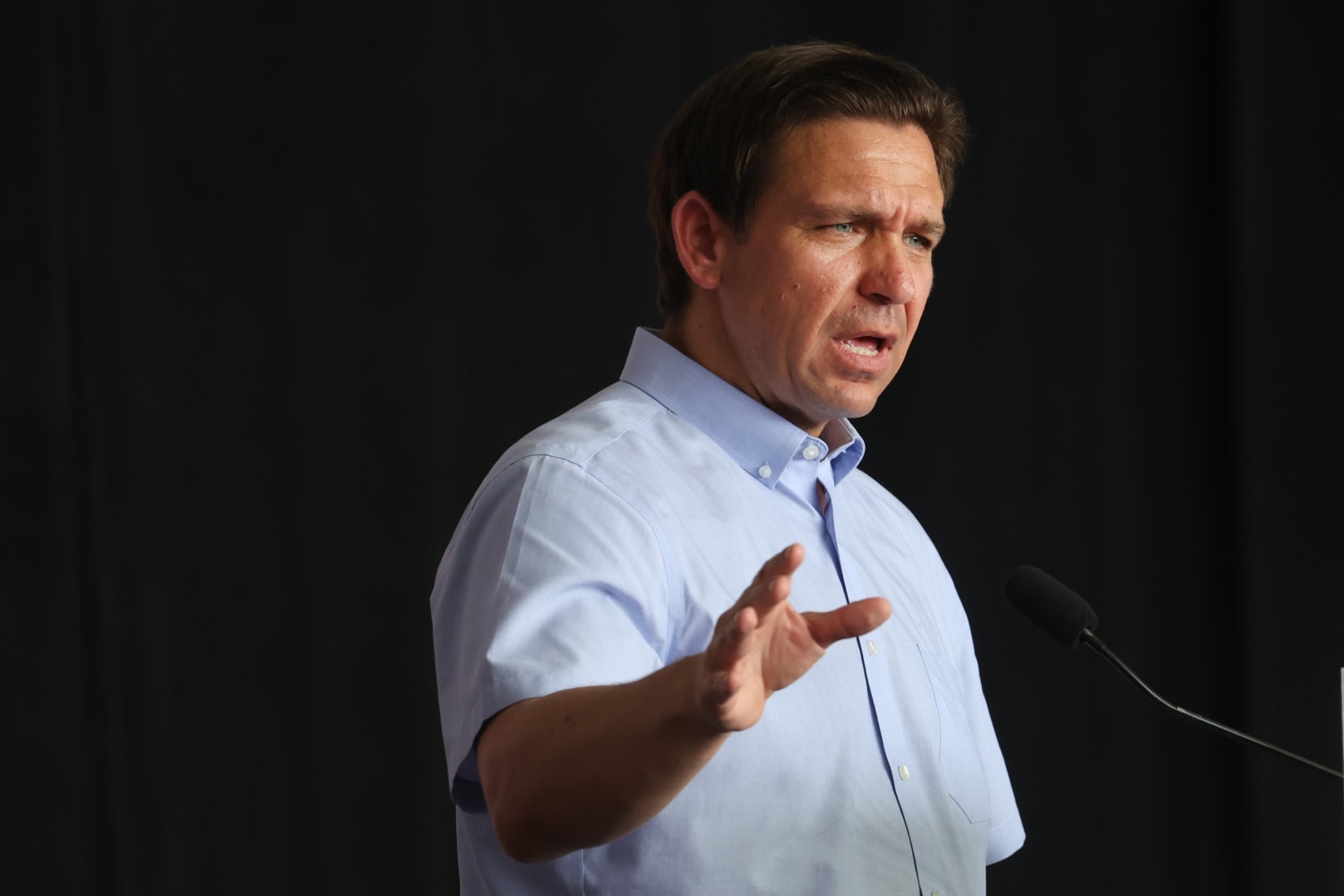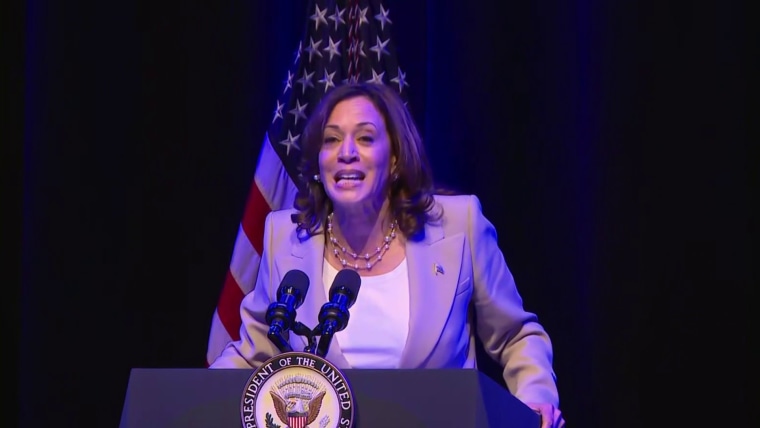A majority of the members of the Florida work group that developed new standards for teaching African American history opposed the sections that have recently drawn criticism, including that middle schoolers be instructed that enslaved people developed “skills” that could be used for their “personal benefit,” three members of the work group said.
The members, who requested anonymity out of fear of reprisal, told NBC News that the majority did not want to include that change or a requirement that high school students be taught about violence perpetrated “by African Americans” when learning about events like the Ocoee and Tulsa Race massacres.
“Most of us did not want that language,” one member said, adding that two of the 13 members of the group pushed to include those specific items.
The standards created by the work group went on to be unanimously approved on July 19 by the Florida Board of Education, which oversees the Education Department. The standards, which are to be used by students in kindergarten through 12th grade, have been widely criticized as “propaganda” and a “sanitized“ version of history.
Critics, including Vice President Kamala Harris, historians, educators and other politicians have said, among other things, that the new standards attempt to mask the many horrors of slavery, including rape, murder and forced labor, trying to portray it as an apprenticeship.
“These extremist, so-called leaders should model what we know to be the correct and right approach if we really are invested in the well-being of our children,” Harris said last week in Jacksonville, where she was joined by the president of the NAACP. “They dare to push propaganda to our children. This is the United States of America. We’re not supposed to do that.”
The work group members who spoke to NBC News said that only two members of the work group, William Allen and Frances Presley Rice, advocated for the criticized language. Allen and Presley Rice, both Black Republicans, released a joint statement last week defending the new standards as “comprehensive and rigorous instruction on African American history.”
“The intent of this particular benchmark clarification is to show that some slaves developed highly specialized trades from which they benefitted,” they wrote. “This is factual and well documented.”
The members said Allen advocated for including that enslaved people benefited from skills that they learned, and Presley Rice pushed to include that students learn about “violence perpetrated against and by African Americans.”
“People were very vocal” and questioned “how there could be a benefit to slavery,” one work group member said about the language.
Allen, the member said, countered the arguments by using Frederick Douglass as an example.
“However, Dr. Allen is focusing on the few slaves who actually did learn something and keeps alluding to Frederick Douglass,” one work group member said. “What he is saying is not accurate for most of the slaves.”
All three members described him in separate interviews as “persuasive” and “knowledgeable” and said the group deferred to him.
Two members said the matter was tabled for a later discussion and did not recall it ever being voted on. One of those members called the language in the final product “problematic” and said the group “could have done a better job” if it had been given more time to work.
Allen did not immediately return a request for comment Friday in response to the members’ characterization of events.
Reached by phone, Presley Rice said: “I recommend highly that you get in touch with the communications department at the Department of Education, and all your questions will be answered,” before ending the call.
The Florida Education Department did not respond to a request for comment.
Education Department mum on work group details
The revelations about the group’s inner workings come as the state maintains a lack of transparency around the work group.
The Education Department has not responded to repeated requests to identify the members of the work group nor has it disclosed how they were selected or detailed how they came up with the new language.
Florida Gov. Ron DeSantis, a Republican presidential candidate, has defended the new standards while also distancing himself from the creation of the changes, which were made to satisfy legislation he signed into law.
“You should talk to them about it,” he said, referring to the group, at an event last week. “I didn’t do it. I wasn’t involved in it.”
DeSantis said he believed “what they’re doing is, they’re probably going to show some of the folks that eventually parlayed, you know, being a blacksmith into doing things later in life.”
The names of the 13 work group members were confirmed to NBC News by two members of the group who asked to remain anonymous.
They are William Allen, LaFrance “Joe” Clarke Jr., Allison Elledge, Kathleen Ems, Roberto Fernandez III, Madonna Higgs, Helen Maffett, Jessica Morey, Kay Pape, Frances Presley Rice, Valencia Robinson, Constance Scott and Laura Wynn.
NBC News sought comment from all of the members through various means, leaving messages for some while others could not be reached.
The group is racially and politically diverse. At least 10 of the members of the work group are teachers or other officials in Florida public schools, making Allen and Presley Rice outliers.
Allen, who lives in Maryland, is a professor emeritus of political science at Michigan State University. He was on the U.S. Commission on Civil Rights under Ronald Reagan. Presley Rice, on her LinkedIn page, describes herself as an “independent consultant, providing advice about the production of African American History documentary production.”
Paul Burns, the state’s chancellor of public schools, said at the Board of Education’s July meeting that 40 people responded to an August 2022 memo seeking “qualified individuals for a workgroup to review the standards related to African American History.” The board also received nominees to the work group from the Commissioner of Education’s African American History Task Force, Burns said.
Thirteen “education stakeholders, including Florida teachers from around the state” were ultimately selected for the work group, he told the board. It is not clear on what criteria the applicants were evaluated.
Task force not consulted on new standards
While most members of the group have kept a low profile, Presley Rice and Allen have spoken out.
“Any attempt to reduce slaves to just victims of oppression fails to recognize their strength, courage and resiliency during a difficult time in American history,” they said in a joint statement after criticism began to mount last week. They mentioned blacksmithing, shoemaking, fishing, teaching and tailoring as examples of skills enslaved people developed. “Florida students deserve to learn how slaves took advantage of whatever circumstances they were in to benefit themselves and the community of African descendants.”
In a post on her Facebook page Saturday, Presley Rice said: “It saddens me to observe how falsehoods are being perpetuated now by some people with questionable intent, using cherry-picked language, taken out of context, to undermine the fact-based Academic Standards crafted by the Workgroup I was a part of, due to my decades-long quest to have the full, unvarnished history told about African Americans.”
In an interview with NBC News earlier in the week, Allen said the work group “deliberated between February and the end of April to review the curriculum standards and to propose new benchmarks and standards.”
“I think we may have had, over the course of the period from February to April, three or four meetings,” he said, adding that each meeting took place over several days at Education Department facilities in Tallahassee.
The individuals who spoke to NBC News said some of the meetings were held over Microsoft Teams and that the entire panel did not attend every meeting. They also did not devise the standards in conjunction with the Commissioner of Education’s African American History Task Force, which was created in 1994 as part of legislation that requires the instruction of history, culture, experiences and contributions of African Americans in the state’s K-12 curriculum.
“Most people think that we work on behalf of the African American History Task Force and that wasn’t the case,” the member said. “It was two separate groups.”
State Sen. Geraldine Thompson, who opposes the new standards, said in an interview with NBC News that she had been involved with the African American History Task Force for decades, but was not aware that there was a work group.
“I don’t know who the people were who worked on this,” she said. “And so, it just kind of engenders an amount of distrust among people in the state who are now given some standards, and they don’t know where they came from, who the people were who developed them. And people that you would expect would be involved or at least informed, were not.”
Another task force member, state Rep. Kimberly Daniels, who was recently appointed, said in a statement this week that she had no role in creating the new standards.
Florida’s Board of Education was required to change its standards for African American history education, among other things, to comply with House Bill 7, also known as the Stop WOKE Act, that DeSantis signed into law in April 2022. It bars instruction that might make members of one race feel guilty for past actions committed by their race and also bars the notion that meritocracy is racist or that people are privileged or oppressed based on race, gender or national origin. It also prevents the teaching of critical race theory. The law is being challenged in court.
De Santis has repeatedly claimed, without evidence, that public school educators have tried to indoctrinate students with a liberal agenda. He has made fighting what he describes as a “woke” agenda a part of his brand. He has used “woke” to describe critical race theory, which examines the systemic role of racism in society and which is not taught in K-12 schools, as well as diversity, equity and inclusion. He also blocked the College Board’s Advanced Placement African American history course, saying it violates state law and is historically inaccurate. The battle over what students are taught is one that is playing out in schools across the country.
De Santis has said Florida’s new African American history curriculum “is rooted in whatever is factual.”
“They listed everything out,” he told reporters last week. “And if you have any questions about it, just ask the Department of Education. You can talk about those folks but I mean, these were scholars who put that together. It was not anything that was done politically.”
Andrew Spar, the president of the Florida Education Association, the state’s largest teachers’ union, has pledged to fight the new curriculum standards.
“Right now we are working to bring people together to get these standards changed or overturned,” he told NBC News last week. “We are concerned about the conflict that teachers have — we are required to be honest and ethical in our dealings and we are required to teach the standards. What do we do if the standards are not honest and ethical?”
Source: | This article originally belongs to Nbcnews.com












